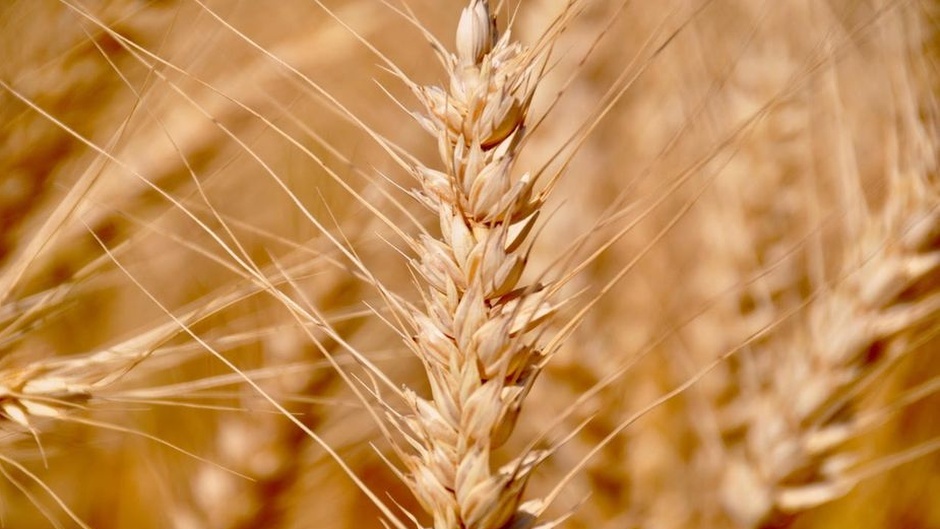There are 24 known species. However, in the Holy Land there are only two: bread wheat, a rare variety as it only grows in Shefela and in the mountains of Judea; and wild emmer wheat, abundant throughout the country.
 Photo: Antonio Cruz.
Photo: Antonio Cruz.
Jesus told them another parable: “The kingdom of heaven is like a man who sowed good seed in his field. But while everyone was sleeping, his enemy came and sowed weeds among the wheat, and went away (Mt. 13:24-25)
The Hebrew word jittah and its plural form jintín refer both to both the grain of wheat and the plant as a whole. It was translated into Greek as pyros, which also means both “cereal” and “wheat”. The term, which appears some 80 times in the Bible, indicates a grass-type plant of the Triticum genus that was grown extensively in ancient times in its region of origin, the Fertile Crescent, and has since spread throughout the world.
Now there are 24 known species of the Triticum genus. However, in the Holy Land there are only two: bread wheat Triticum aestivum (formerly known as T. vulgare), which is a rare variety as it only grows in Shefela and in the mountains of Judea; and wild emmer wheat, Triticum dicoccoides, abundant throughout the country, from Judea to Galilea.
Wheat originated in ancient Mesopotamia and there is archaeological evidence that it was grown as a crop more than 8,000 years ago in Syria, Jordan, Israel and Iraq. It is thought that wild wheat must have been the result of a mutation, or perhaps, hybridisation, which produced a plant with larger seeds which could therefore not be disseminated by the wind. Its cultivation by human beings gave rise to an agricultural revolution in the Fertile Crescent, which passed from nutrition based on hunting and gathering to a diet containing a great deal of wheat and other cereals such as barley and rye.
In Canaan wheat was already known from the Bronze Age (Gn. 30:14; Ex. 9:32; 29:2; 34:22; Dt. 8:8; 32:14; Jud.. 6:11; 15:1; Ruth 2:23; 1 S. 6:13; 12:17; 2 S. 4:6; 17:28; 1 R. 5:11; 2 R. 4:42; 1 Cr. 21:20, 23; 2 Chron. 2:10, 15; 2 Cr. 27:5; Ezra. 6:9; 7:22; Job 31:40; Psalm. 78:24; 81:16; 147:14; Pr. 27:22; Song of Songs. 7:2; Is. 28:25; 62:8; Jer. 12:13; 41:8; Lm. 2:12; Ez. 4:9; 16:13; 27:17; 36:29; 45:13; Os. 2:8, 9, 22; Jl. 1:10, 11, 17, 24; Am. 5:11; 8:5, 6; Hag. 1:11; Zac. 9:17; Mt. 3:12; 13:24, 25, 29, 30; Lc. 3:17; 16:7; 22:31; Jn. 12:24; Acts. 7:12; 27:38; 1 Co. 15:37; Rev. 6:6; 18:13).
A cereals-based economy was important throughout Israel. The Hebrew people basically lived on it, and it was so abundant during certain periods that is was wheat that made it possible for example, for King Solomon to pay for the materials and the manpower required to build the temple (1 Kings 5:11). Even many years later, Judah and Israel still exported wheat to Tyre (Ezekiel. 27:17). In Palestine wheat was sown in November or December, after the first rains, and could be reaped in April, May or June, depending on the climate in the regions in question. The bread that the Hebrews ate most was made from wheat flour (Gen, 18:6; Ex. 29:2). It was also used as an offering, and toasted loose grains were eaten (Lv. 2:14, 16; Rut 2:14) as a light, easily portable food (1 S. 17:17; 25:18; 2 S. 17:28).
In the New Testament we also notice that the Jews also ate raw grains of wheat directly from the ear, as Jesus’s disciples did (Matt. 12:1). The Master metaphorically refers to the children of the Kingdom as wheat, as contrasted with the tares that Satan sowed in secret (Matt. 13:25-30).
And Jesus compared himself to a grain of wheat, which must first fall to the ground and die before rising again and bearing much fruit, clearly alluding to the gentiles who were also looking for him, as the Kingdom was not only intended for the people of Israel (Jn. 12:24)
The English Baptist pastor, John Gill, wrote the following words in the 18th century, commenting on Psalm 132 (v.15): her poor I will satisfy with food.
“… there are poor in all the churches of Christ: our Lord told his disciples that they had the poor, and might expect to have them, always with them; and particular directions are given to take care of Zion's poor under the gospel dispensation, that they may not want bread in a literal sense: though by the poor are chiefly designed the Lord's afflicted and distressed ones; or those who in a spiritual sense are poor, sensible of their spiritual poverty, and seeking after the true riches; or are poor in spirit, to whom the kingdom of heaven belongs; these the Lord promises to satisfy, to fill them to the full with the bread of the gospel, made of the finest of the wheat, of which there is enough and to spare in his house; and with Christ the bread of life, of which those that eat shall never die, but live for ever.” [1]
[1] Spurgeon, C. H. Treasury of David

Las opiniones vertidas por nuestros colaboradores se realizan a nivel personal, pudiendo coincidir o no con la postura de la dirección de Protestante Digital.
Si quieres comentar o